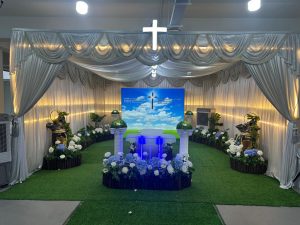
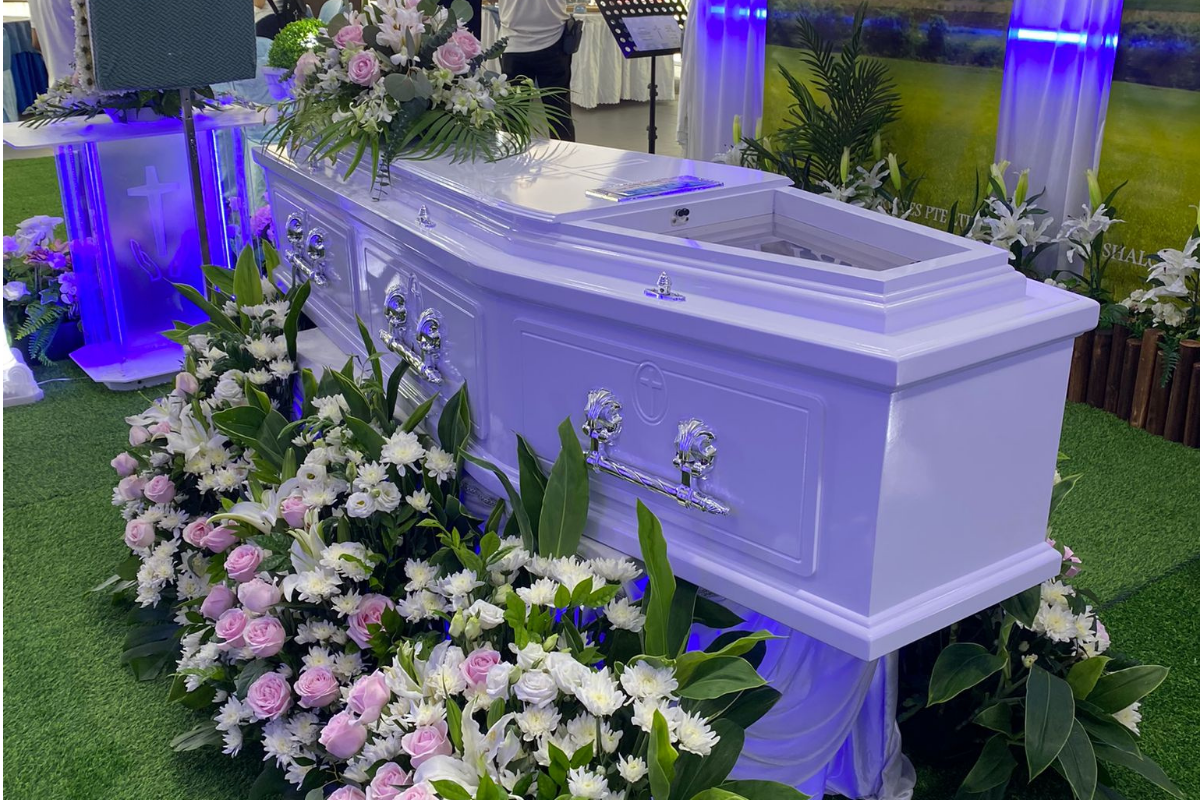
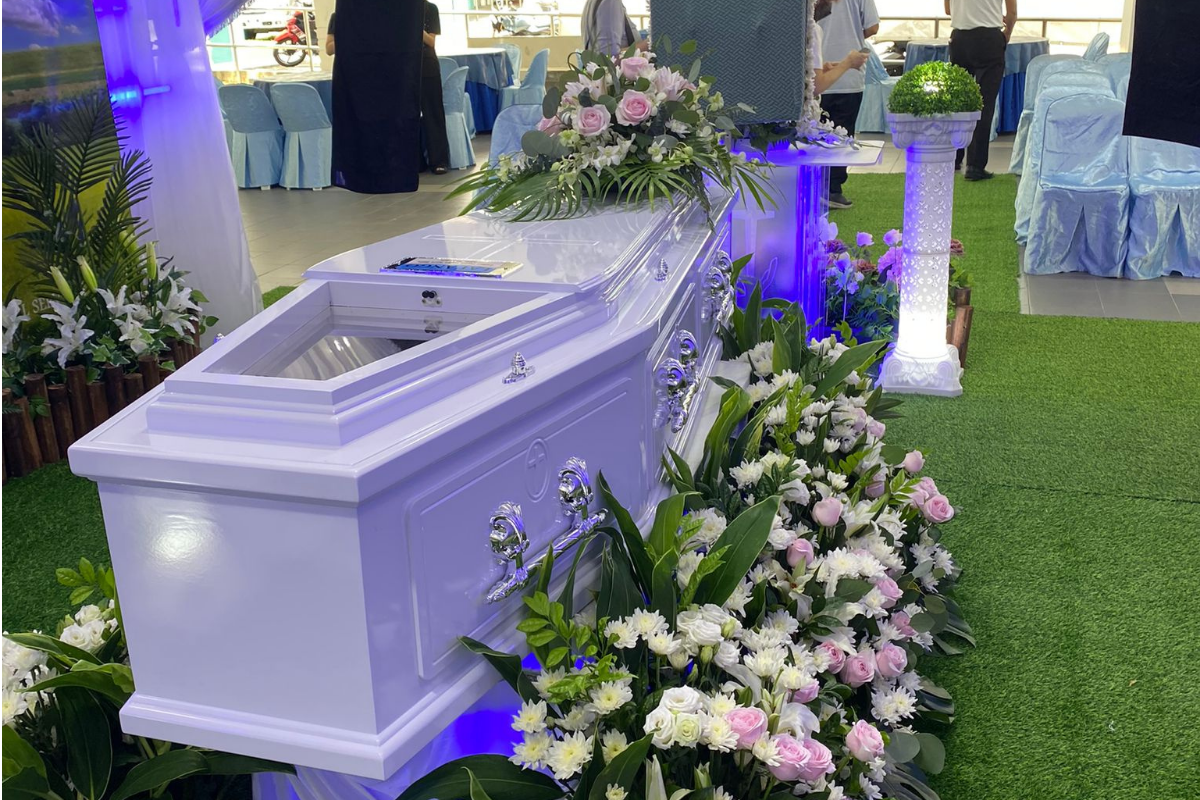
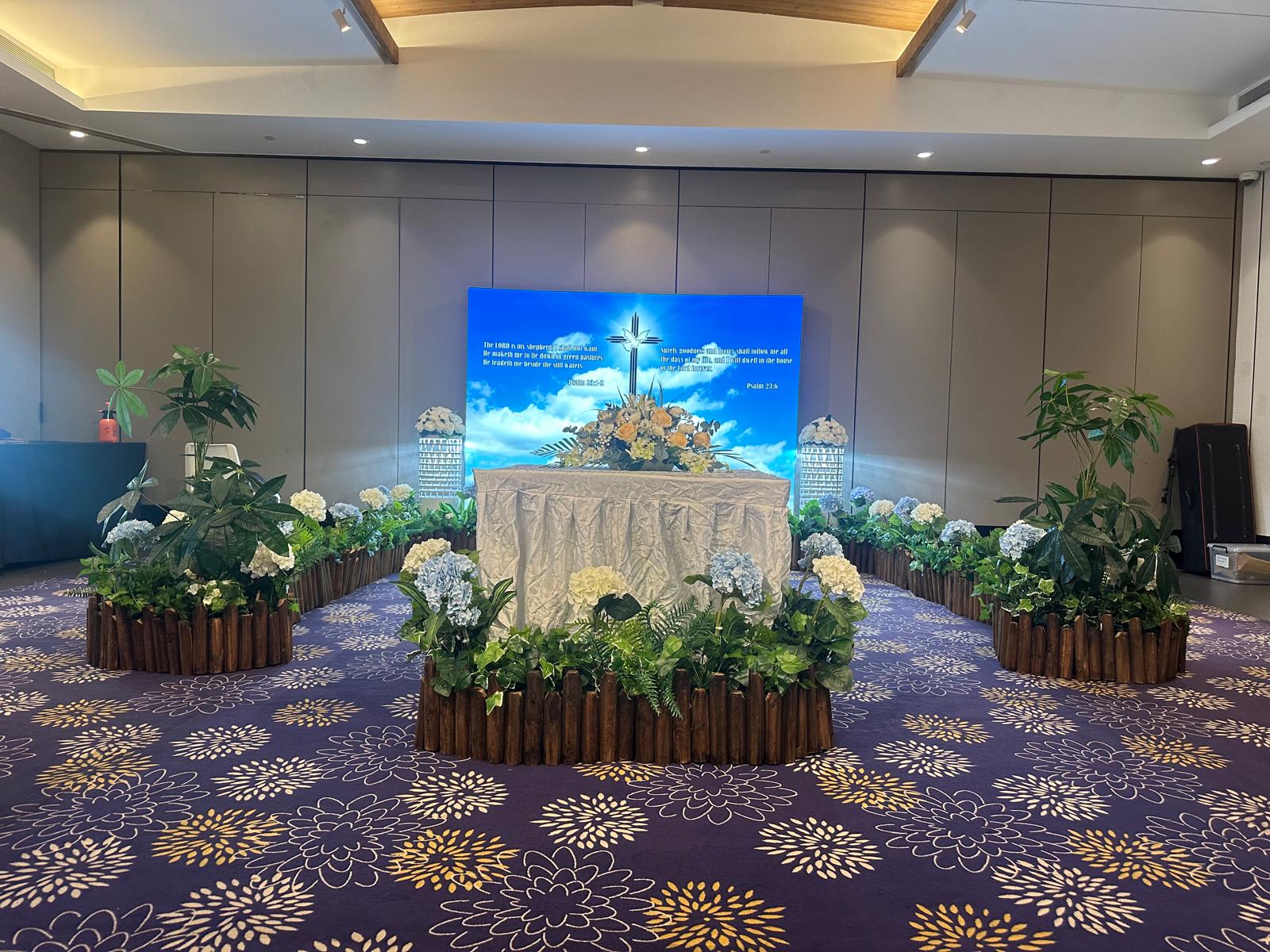












Christian Funeral Services
The death of a loved one is often a time of reflection. Many people who have lived a good life and have done their best to live by the teachings of Jesus Christ are comforted in knowing that they are going to be with the Lord when they die. But even so, it can be a difficult time for family members who are left behind. The knowledge that their loved one is going to be taken care of by God doesn’t make the loss any easier to bear.
We understand this, and we want to make things easier for you during your grieving process. Here are all the details you need to know about Christian funeral services in Singapore
What is the purpose of Christian funeral services?
To handle all the logistics and most of the planning while the client gathers family, friends, and acquaintances to mourn, offer support, and pay their last respects to the deceased.
What happens at Christian funerals?
At a Christian funeral service, the body of the deceased is usually present in a traditional casket, or cremation urn, surrounded by flowers and with a portrait picture of themself propped in front (their passport/IC picture if necessary).
Before the Christian funeral service
Friends and family gather together before the actual funeral service. Here they exchange memories, read prayers, and hymns are sung – it is generally considered a celebration of life. This ceremony usually occurs at the bereaved family’s home, a Christian church, or even at the funeral home.
The day of the Christian funeral service
The Entrance – once the friends and family have arrived at the venue, pall-bearers will carry the coffin to the room/burial site. A preacher will sprinkle holy water over the coffin or casket and read a passage from the bible.
Hymns – When you are seated, you might receive a small booklet filled with Christian songs and hymns that are hand-picked by the deceased or the family of the deceased. The lyrics are usually comforting and encouraging, giving hope to those attending.
Prayers/“Psalms” – Thanksgiving prayers are commonplace and comforting scriptures (especially Psalm 23) are almost always read during the Christian funeral service.
Eulogy – This is where many, even those who are not close to the deceased, are moved to tears. Parents, siblings, and those closest to the deceased will give a loving, warm-hearted, tear-jerking speech about the deceased. How they met, their first impressions, their journey of friendship and trust, etc. Sometimes, there are light jokes thrown around, but overall, the eulogy is a reflection back on the decreased life through the eyes of the living. Paying tribute to their achievements and memories sewn amongst their loved ones.
Mass – This is more commonly found in Catholic funeral services, but Christian funeral services often have them as well. The preacher will deliver a short sermon, no less than 30 minutes, to the crowd and then partake in the Holy Communion (the elements of the Lord’s supper should already be distributed to believers prior).
Rite of Committal – Family members and friends will leave the area and move to the gravesite/crematorium/ocean/tree/wherever the ashes or body will go. Some guests who are not close to the deceased may choose to leave at this point. At the destination, friends and family make their final farewells with prayers and hymns.
Burial – The final chapter of the Christian funeral service.
The day after the Christian funeral service
A common Christian tradition is for close friends and family to gather at the site of burial, the home of the deceased, or a church after the funeral so that members can comfort and express condolences. Food and drinks are usually prepared, but some families do a potluck where each person contributes a dish for everyone to partake in.
When are Christian funerals held?
Christian funerals usually are held two to three days after a person dies, though they may take place any time within a week of the person’s death.
How long do Christian funerals last?
The majority of Christian funeral services will last between 40 minutes to an hour. If the preacher talks more during the mass, it might take longer.
Should I expect gifts for a Christian funeral?
Usually, there is no need for gifts but any form of donation should be accepted and greatly appreciated (unless your family’s tradition makes it mandatory). You could request for a sympathy gift in terms of money, flowers, a card, or a sweet gesture (e.g. offer to do their grocery shopping for the week while they mourn).
What do you wear to a Christian funeral service?
Because a funeral is a somber occasion, it is best to dress in conservative colors and styles. Black, white, and muted colours like brown, gray, and blue for example. Do not wear bright colours, casual clothes, fashionably ripped jeans, etc.
Can children attend a Funeral?
Yes, as long as the host and the child’s parents agree to it. Parents should also keep their children close at hand so that they do not make a ruckus and cause mischief while the rest of the attendees are mourning.
Can non-Christians be invited to a Christian funeral?
Yes, anyone who is related to the deceased and is invited by the host can come to pay their last respects. Non-Christians won’t need to partake in the Lord’s Supper either, just make sure that they remain respectful during procedures.
What should I prepare for when considering Christian funeral services?
First, check your budget and consider your expectations for the funeral. Do you want it to be grand, or simple? How many seats are you expecting to be filled? The 4k – 5k budget changes depending on your options, so it’s best to discuss with family and friends your budget, finances, and consider pooling money together if needed.
Questions Christian funeral services might ask you:
How long the funeral should be held – A Christian funeral can be held in a single day, however, if customs and traditions in the family must be upheld, or if you would like to extend the funeral dates because a relative from overseas is rushing back, you can extend it up to 7 days usually.
Location of the Christian funeral wake – You can hold the wake at your home or at a funeral parlour. Doing it at home, at your HDB, or private apartment will be cheaper compared to renting out the funeral parlour venue. However, holding the funeral at home means that there is no way to lock up the venue and safe keep items for the following day. Someone must stay up overnight to keep watch. The funeral parlour is more expensive, but more convenient when it comes to locking up and retiring home to rest.
Casket type to be used – A cremation urn, wooden casket, paper casket, or metal casket. Costs differ greatly, and it’s up to the host’s preferences. You may want to consult with your family first (especially the older ones who like to uphold tradition).
Reception, food & water catering, music, video, photographs – These arrangements heavily depend on how lavish you want the whole event to be. Typically, Singaporean Christians will go for the cheaper options as they prefer to keep things ‘humble’, but sometimes, family circumstances demand that the funeral has to be impressive to see off the deceased with a grand farewell. Talk to your Christian funeral servicer on what you would like the funeral to be like, they will make known to you options and prices that you can ponder on.
Burial type – Sometimes, the deceased will insist prior to their passing on how they want to be buried. There are a few options in Singapore.
- There is only one cemetery available at Choa Chu Kang. The burial period is limited to 15 years. After that, the remains have to be cremated or re-interred.
- Some dying individuals dream of scattering their ashes at sea so that they can be “free in death”. This is definitely one way to go. It is cheaper in the long run as there is no need to maintain the burial site, and you won’t have to pay to store the urn at a columbarium.
- Tree burial. This is the most eco-friendly and economical solution. Your remains will be planted with a seed that will grow into a tree. It’s like the circle of life, old life that helped give birth to a new one. Future generations will also be able to visit that tree to pay respects.
- You can store some of the ashes of the deceased in a locket, or get a professional to turn them into diamonds or even gemstones (thousands of dollars…).
- This is the most common burial type. It requires an urn, a niche to place it in, and a marble plaque with the details of the deceased to seal the urn in. It has to be placed in either (1) a government-owned columbarium, or (2) a privately owned one. Prices vary accordingly.
Obituaries – If you want to share news of your loved one’s passing quickly, buy an obituary in the Straits Times and 早报. Photos and a short biographical account will need to be provided.
Deceased belongings to be cremated – Keeping all of your deceased loved one’s belongings with you can be painful. It brings back painful memories that make it hard to move on. So you might want to consider donating them, selling them, or if you can’t bear to give them away, just put them in the casket and have them cremated alongside the deceased. Do not that glass, rubber, and large metal items cannot be cremated.
Tips for the grieving individual
- Facing your loss is difficult. You may not feel like attending the funeral at all. You might not even want to think about it. But attending the service can be a very helpful part of the healing process for you and your family, as well as for all those who are important to you.
- It is important to remember that it is not your responsibility to make every attendee feel better at the funeral. You are grieving as well and must take care of yourself before you can help others.
- There is no right way to grieve, but try your best to maintain your composure and treat others with kindness. This may be a difficult task but try your best.
- If you feel your grief overwhelming you, take a break from the situation for a few minutes and go somewhere quiet where you can calm down and breathe deeply for a few minutes before returning.
Conclusion
We hope that our article will serve you well and that your funeral service can be a lovely affair, where you converse with family and friends, exchange memorable stories of the deceased, celebrate their life, and remember your time together.
We believe that you are strong enough to get through this. Remember, a Christian will be born again. This is not the last time you will see them. Keep the faith and thank you for reading.
All about Christian funeral service; how its different from the Catholic funeral service
Introduction
When someone dies, that person’s family may choose to have a Christian funeral service, and a Christian funeral will be shorter and more streamlined than a Catholic funeral service.
It’s also not considered appropriate for people outside the family to speak during these services.
Christian beliefs about death
When Christians die, their beliefs about death are often different than those of Catholics, and Christians believe death is not the end of life but a transition into another state of being.
They don’t believe in an afterlife where you will see your loved ones again or reunite with God. Instead, they hold onto the hope that one day they will be resurrected when Jesus returns to earth.
What happens at a Christian funeral?
A Christian funeral service is a public event in a church or other place of worship, and it’s led by a minister or priest and attended by family, friends, and the community.
This article gives a clear flow of events before, during, and after a Christian funeral service.
Events before the funeral service
Before the funeral service, some events will take place. These include A vigil which is usually held at night or early in the morning, and it’s a time for people to gather together and pray for the deceased person.
A funeral procession is when you stroll behind your loved one’s casket as they are transported from one place to another. Even though this isn’t technically part of the Catholic funeral service itself, it’s still essential in honoring the deceased.
Events on the day of the funeral service
On the day of the funeral service, several events take place. The first event is when you arrive at church, and you will be greeted by a minister or priest, who will lead your family into their seats in the church.
Next, hymns will be sung during this time, as well as prayers said over your loved one’s body before they are buried at their final resting place.
Psalms are also read during this part of the ceremony, which helps people remember how much God loves us and watches over us through all our trials in life (Psalms 23:4).
After these things have been done, Mass begins with Communion being distributed to those who wish to receive it while listening closely to what Jesus teaches us through his words spoken during Mass.
All these are done in preparation for the burial, which will be done after the Mass service session.
Events after the funeral
After the funeral service, there may be a reception or wake. This is an opportunity for family and friends to gather together and share memories of the deceased.
The funeral service is often the first and last time you will see all these people who came to pay their respects, so you must take advantage of this opportunity.
The funeral is also an act of love and cares for your loved one: it helps them transition peacefully into death by giving them one last chance to be honored in front of those they care about most.
Duration of a Christian funeral
A Christian funeral service consists of a short ceremony that lasts about an hour. It’s typically held in a church or other religious building, but it can also be held at home if you’re planning on cremating your loved one’s body.
Depending on what church you belong to, the ceremony will be different. However, all Christian funerals have some things in common.
Christians and cremation
Cremation is not a common practice in the Christian faith, and it’s usually not talked about because it goes against the idea that people will come back to life in their bodies at the end of time.
This can confuse people who want to be cremated out of respect for their loved ones but also want to honor their religious beliefs.
The Catholic Church remains firmly against cremation, though exceptions are made when necessary.
Christian funeral rites
A eulogy is a speech given by someone who knew the deceased. It’s usually delivered at the funeral service but can also be provided at another time if appropriate.
A eulogy’s primary goal is to impart recollections about your loved one, how they made you feel, and what they meant to you.
The prayers during the ceremony will differ depending on your denomination or the customs practiced within that denomination: some denominations may pray, while others read scripture readings aloud.
A Bible reading may also occur during this time; this can be done by anyone who knows how. But typically, someone from within Christianity would read verses from one of its holy books.
Conclusion
The Christian funeral service is an essential part of the grieving process. It’s when you say goodbye to your loved one, which can be an emotional time for everyone involved.
If you’re planning on attending a Christian funeral service or hosting one yourself, there are some things that you should know beforehand so that everything goes smoothly.
- Half glass coffin 棺木 (E20)
- Pall bearer services 工人
- Transportation 车费 {Van for Shifting, Sending, Funeral}
- Hearse灵车
- Embalming 防腐和化妆 {Post Mortem add $180}
- Embalming room防腐房
- Photo enlarge 冲洗照片 {Complimentary first photo}
- Photo wreath & table top 照片和桌花
- One bus on funeral day 巴士 {45 seater}
- Landscape decoration * Artificial flower *
- PA system 音响



- Half glass coffin 棺木
- Pall bearer services 工人
- Transportation 车费 {Van for Shifting, Sending, Funeral}
- Limousine Hearse灵车
- Embalming 防腐和化妆 {Post Mortem add $180}
- Embalming room防腐房
- Photo enlarge 冲洗照片 {Complimentary first photo}
- Photo wreath & table top 照片和桌花
- Coffin top flower 棺木花 (Heart Shape)
- One bus on funeral day 巴士 {45 seater}
- PA system 音响
- Landscape decoration

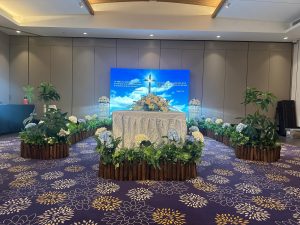
- Half glass coffin 棺木 (E80)
- Pall bearer services 工人
- Transportation 车费{Van for Shifting, Sending, Funeral}
- Hearse灵车
- Embalming 防腐和化妆 {Post Mortem add $180}
- Embalming room防腐房
- Photo enlarge 冲洗照片{Complimentary first photo}
- Photo wreath & table top 照片和桌花
- Coffin top flower (Heart Shape)
- One bus on funeral day 巴士 {45 seater}
- Landscape decoration * Artificial flower *
- 55” Flat Screen Television
- PA system 音响
- Hot Drinks Dispenser Machine (1 package power complimentary)
- Servers X 2 (Last Night)
- 10 carton mineral water and 10 carton packet drink, peanut, sweet…etc
- 1 mobile toilet, 1 chiller
- 40 pax Buffet dinner (Last night)

